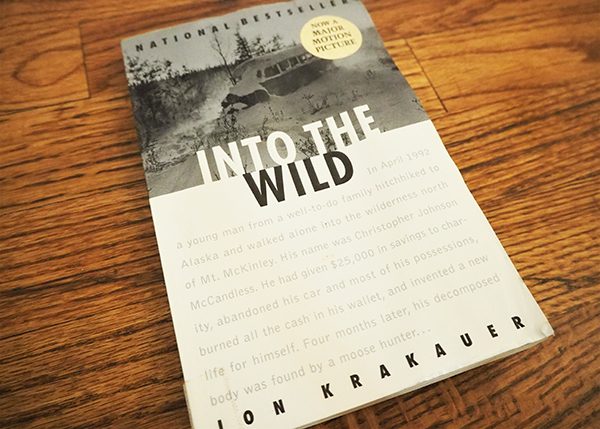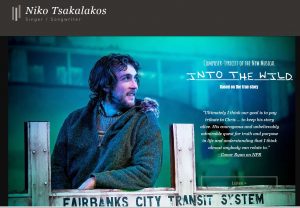The author of “Into the Wild” doesn’t want an encore of the musical it inspired.
Jon Krakauer — whose 1996 best-seller tells the story of Chris McCandless, an idealistic twentysomething who traveled the country before dying in a remote part of Alaska in 1992 — last week sued Nikos Tsakalakos and Janet Allard, developers of the musical.
The lawsuit, filed in Boulder County District Court, indicates Krakauer signed an agreement with the playwrights in 2013, but since has soured on the production. The author is asking a court to affirm that the agreement states that the musical can’t be produced without his OK.
Tsakalakos and Allard did not respond to separate requests for comments made through their websites.
Krakauer’s lawsuit also names as a defendant The Christopher Johnson McCandless Memorial Foundation, which was also a party to the 2013 agreement. The foundation, which manages McCandless’ estate and is led by his father, also did not respond to a request for comment.
Into the Wild is one of Krakauer’s most well-known books, and the work gave McCandless, who traveled under the name “Alexander Supertramp,” something of a post-mortem fan base. Krakauer’s book has already been adapted into a movie, which was directed by Sean Penn and released in 2007.
According to the lawsuit, in January 2013, Tsakalakos and Allard sent a letter “proposing an agreement” to Krakauer and the McCandless foundation. Both parties ultimately signed the agreement.
The musical, titled “Into the Wild,” premiered in April 2017 in Dexter, Michigan, a small municipality near Ann Arbor, according to the lawsuit. The playwrights advertised that the production was based on Krakauer’s work. (Portions of the songs from the production can be heard on Tsakalakos’ website.)
In December 2017, Tsakalakos and Allard proposed an addendum to the agreement outlined in the January 2013 letter, according to the lawsuit.
Krakauer did not sign the addendum, and said in the lawsuit that he believes the foundation also did not do so.
Krakauer claims that the original 2013 agreement gave him the right to approve future productions of the musical, including the right to approve the title, script and lyrics.
“Under the terms set forth … if Mr. Krakauer disapproves of any production of the Musical after the initial production, such production cannot proceed,” the lawsuit says.
In May 2018, attorneys for Krakauer told Tsakalakos and Allard that the author had “found the script objectionable,” according to the lawsuit, and wanted the two to remove all references to the musical being adapted from Krakauer’s book.
Krakauer also “requested that they inform all existing and future investors in the Musical that Mr. Krakauer has not been involved with the musical, and that he had requested his name not be associated with it in any way,” the lawsuit says.
In June, Krakauer’s attorneys followed up on the matter, telling Tsakalakos and Allard that “Into the Wild,” which is a trademarked phrase, could not be part of the production’s name, the lawsuit said.
Krakauer claims that Tsakalakos and Allard agreed in July to remove the phrase, but then said in an email last month that, after consulting with McCandless’ father, they believed they had the right to call the production “Into the Wild: A New Musical.”
The lawsuit doesn’t specify why Krakauer doesn’t like the musical or to what extent the script has changed since the original 2017 production.
William D. Meyer and Collen M. Koch of Boulder’s Hutchinson Black and Cook are representing Krakauer. Koch did not respond to requests for comment. Krakauer’s website does not provide a way to contact him directly.
The playwrights appear to have a wider run in mind from the start. The 2017 production was touted as a “developmental premiere,” and the decision to open in Dexter, population 4,000, was described as a way for the show to be refined “out of sight.”
Conor Ryan, the actor who played McCandless in the 2017 production told the Detroit News that an Alaskan theater originally commissioned the musical, but that the playwrights ultimately decided it best to premiere in the lower 48.
“Chris McCandless ticks Alaskans off,” Ryan said last year. “To them he was an idiot who didn’t respect the land.”
The musical does not appear to have been produced outside of Michigan.
Allard’s website now refers to the play as “Alexander Supertramp” and says it is “based on a true story and Back to the Wild,” a separate book not authored by Krakauer that features McCandless’ journal entries.
The author of “Into the Wild” doesn’t want an encore of the musical it inspired.
Jon Krakauer — whose 1996 best-seller tells the story of Chris McCandless, an idealistic twentysomething who traveled the country before dying in a remote part of Alaska in 1992 — last week sued Nikos Tsakalakos and Janet Allard, developers of the musical.
The lawsuit, filed in Boulder County District Court, indicates Krakauer signed an agreement with the playwrights in 2013, but since has soured on the production. The author is asking a court to affirm that the agreement states that the musical can’t be produced without his OK.
Tsakalakos and Allard did not respond to separate requests for comments made through their websites.
Krakauer’s lawsuit also names as a defendant The Christopher Johnson McCandless Memorial Foundation, which was also a party to the 2013 agreement. The foundation, which manages McCandless’ estate and is led by his father, also did not respond to a request for comment.
Into the Wild is one of Krakauer’s most well-known books, and the work gave McCandless, who traveled under the name “Alexander Supertramp,” something of a post-mortem fan base. Krakauer’s book has already been adapted into a movie, which was directed by Sean Penn and released in 2007.
According to the lawsuit, in January 2013, Tsakalakos and Allard sent a letter “proposing an agreement” to Krakauer and the McCandless foundation. Both parties ultimately signed the agreement.
The musical, titled “Into the Wild,” premiered in April 2017 in Dexter, Michigan, a small municipality near Ann Arbor, according to the lawsuit. The playwrights advertised that the production was based on Krakauer’s work. (Portions of the songs from the production can be heard on Tsakalakos’ website.)
In December 2017, Tsakalakos and Allard proposed an addendum to the agreement outlined in the January 2013 letter, according to the lawsuit.
Krakauer did not sign the addendum, and said in the lawsuit that he believes the foundation also did not do so.
Krakauer claims that the original 2013 agreement gave him the right to approve future productions of the musical, including the right to approve the title, script and lyrics.
“Under the terms set forth … if Mr. Krakauer disapproves of any production of the Musical after the initial production, such production cannot proceed,” the lawsuit says.
In May 2018, attorneys for Krakauer told Tsakalakos and Allard that the author had “found the script objectionable,” according to the lawsuit, and wanted the two to remove all references to the musical being adapted from Krakauer’s book.
Krakauer also “requested that they inform all existing and future investors in the Musical that Mr. Krakauer has not been involved with the musical, and that he had requested his name not be associated with it in any way,” the lawsuit says.
In June, Krakauer’s attorneys followed up on the matter, telling Tsakalakos and Allard that “Into the Wild,” which is a trademarked phrase, could not be part of the production’s name, the lawsuit said.
Krakauer claims that Tsakalakos and Allard agreed in July to remove the phrase, but then said in an email last month that, after consulting with McCandless’ father, they believed they had the right to call the production “Into the Wild: A New Musical.”
The lawsuit doesn’t specify why Krakauer doesn’t like the musical or to what extent the script has changed since the original 2017 production.
William D. Meyer and Collen M. Koch of Boulder’s Hutchinson Black and Cook are representing Krakauer. Koch did not respond to requests for comment. Krakauer’s website does not provide a way to contact him directly.
The playwrights appear to have a wider run in mind from the start. The 2017 production was touted as a “developmental premiere,” and the decision to open in Dexter, population 4,000, was described as a way for the show to be refined “out of sight.”
Conor Ryan, the actor who played McCandless in the 2017 production told the Detroit News that an Alaskan theater originally commissioned the musical, but that the playwrights ultimately decided it best to premiere in the lower 48.
“Chris McCandless ticks Alaskans off,” Ryan said last year. “To them he was an idiot who didn’t respect the land.”
The musical does not appear to have been produced outside of Michigan.
Allard’s website now refers to the play as “Alexander Supertramp” and says it is “based on a true story and Back to the Wild,” a separate book not authored by Krakauer that features McCandless’ journal entries.



Leave a Reply